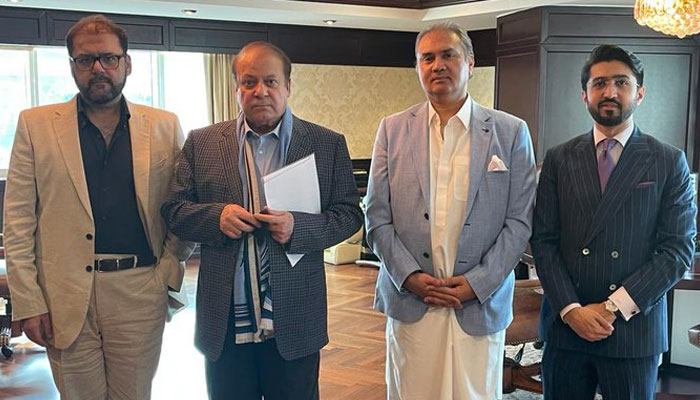Nawaz Sharif’s re-redux
Nawaz Sharif is the proverbial Lazarus of Pakistani politics. He has survived it all: dismissal of government in 1993, military coup d’etat in 1999, disqualification and dismissal in 2017, two long exiles, months-long dharna, excruciating decade-long media slander, prolonged detention, and stints in jail. Yet, what many think of as the past has become the future of Pakistani politics. Sharif returns today vindicated.
Of the four general elections held in Pakistan this century, Sharif was eliminated forcibly from even contesting three. The one he did contest in 2013 led to his third premiership, which was the most successful elected government in Pakistan’s history.
On Sharif’s watch during 2013-17, Pakistan prevailed over four previously intractable challenges: terrorism, inflation, target-killing in Karachi, and loadshedding; not to mention the only successful completion of an IMF programme in Pak history 2013-16. CPEC, GSP Plus trade facilitation from the European Union, 3G/4G mobile internet, first defence cooperation agreement with Russia, and Pakistan’s permanent membership in Shanghai Cooperation Organization were major achievements.
In the 38 years between 1985 and 2023, Sharif was prime minister for no more than nine years. He heralded the liberalization of Pakistan’s economy and communications during his first term (1990-93), declared Pakistan as a nuclear power in his second (1997-99), and has been the principal builder of the country’s civilian and defense infrastructure across his three terms.
Sharif has made a career of picking up the pieces after Pakistan’s democratic, constitutional, economic, and governance crises. Be it the aftermath of Soviet Union’s withdrawal from Afghanistan in 1989, nuclear explosions by India in 1998 and the Kargil War of 1999, or the murderous terrorism that bloodied the land between 2007 and 2014.
The arc of Sharif’s relationship with the establishment is a subject in its own right. He has traversed a long tortuous path from protege to pro-democracy protagonist. He has faltered on occasion, but the direction of his journey is unmistakable. He did what no one could imagine ever happening in the land of the pure: brought a former dictator before a court of law in 2013. And then paid the price beginning from the dharna in 2014 to Dawn Leaks to disqualification a scant three years later.
His return signifies a catastrophic failure of powerful forces' decades-long anti-corruption narrative and their apotheosis in the political-engineering project that imposed Imran Khan on Pakistan. The 2011-22 Project Imran exposed the personalist and authoritarian basis of state institutions.
Where do we go next? Inflation is the foremost challenge, but it is a symptom, not the disease. Nawaz Sharif returns today to an exhausted polity, a battered judiciary, an imploded bureaucracy, wounded powers-that-be, and an antiquated economy. An integral part of each of these crises is a post-truth, mercenary, mendacious media – electronic as well as social.
Nawaz Sharif’s return is the strongest guarantee that elections will take place. The presence of Pakistan’s most-experienced statesman in the political arena is also a guarantee of democratic space for other political parties. The survival of the PML-N intact through its travails of 2017-22 is a foundation to build on in all four provinces.
The catastrophic failures noted above have nonetheless shown us where to go next: the quotidian but hitherto untried avenue of liberalization of economy, modernization of agriculture, supremacy of the constitution and primacy of parliament. So much is riding on Sharif’s shoulders.
The writer is a former member of the National Assembly. He tweets/posts @kdastgirkhan
-
 Ghost's Tobias Forge Makes Big Announcement After Concluding 'Skeletour World' Tour
Ghost's Tobias Forge Makes Big Announcement After Concluding 'Skeletour World' Tour -
 Katherine Short Became Vocal ‘mental Illness’ Advocate Years Before Death
Katherine Short Became Vocal ‘mental Illness’ Advocate Years Before Death -
 SK Hynix Unveils $15 Billion Semiconductor Facility Investment Plan In South Korea
SK Hynix Unveils $15 Billion Semiconductor Facility Investment Plan In South Korea -
 Buckingham Palace Shares Major Update After Meghan Markle, Harry Arrived In Jordan
Buckingham Palace Shares Major Update After Meghan Markle, Harry Arrived In Jordan -
 Demi Lovato Claims Fans Make Mental Health Struggle Easier
Demi Lovato Claims Fans Make Mental Health Struggle Easier -
 King Hospitalized In Spain, Royal Family Confirms
King Hospitalized In Spain, Royal Family Confirms -
 Japan Launches AI Robot Monk To Offer Spiritual Guidance
Japan Launches AI Robot Monk To Offer Spiritual Guidance -
 Japan Plans Missile Deployment Near Taiwan By 2031 Amid Growing Regional Tensions
Japan Plans Missile Deployment Near Taiwan By 2031 Amid Growing Regional Tensions -
 Meghan Markle, Prince Harry Spark Reactions With Latest Announcement
Meghan Markle, Prince Harry Spark Reactions With Latest Announcement -
 Kate Hudson Reflects On Handling Award Season With No Expectations
Kate Hudson Reflects On Handling Award Season With No Expectations -
 6 Celebrities Who Have Been Vocal About Anxiety And 'panic Attacks'
6 Celebrities Who Have Been Vocal About Anxiety And 'panic Attacks' -
 Is This The Future Of Train Travel? Robot Dogs, Drones Are Redefining Public Transit Safety Through China’s New Metro Station Deployment
Is This The Future Of Train Travel? Robot Dogs, Drones Are Redefining Public Transit Safety Through China’s New Metro Station Deployment -
 Sarah Ferguson Seeks Hollywood Backing As Epstein Files Resurface
Sarah Ferguson Seeks Hollywood Backing As Epstein Files Resurface -
 China’s AI Milestone: ByteDance’s Doubao Chatbot Hits 100M Users During Lunar New Year
China’s AI Milestone: ByteDance’s Doubao Chatbot Hits 100M Users During Lunar New Year -
 Think You Know ChatGPT? Here Are 5 AI Levels You’ve Never Seen
Think You Know ChatGPT? Here Are 5 AI Levels You’ve Never Seen -
 Bitcoin Bounces From $62,000 As On-chain Metrics Signal Prolonged Weakness: Here Is Everything To Know
Bitcoin Bounces From $62,000 As On-chain Metrics Signal Prolonged Weakness: Here Is Everything To Know




